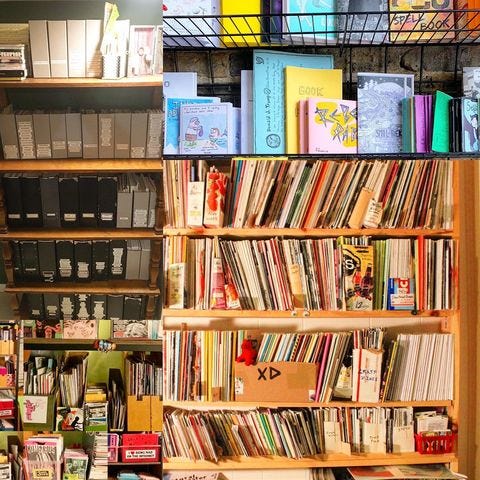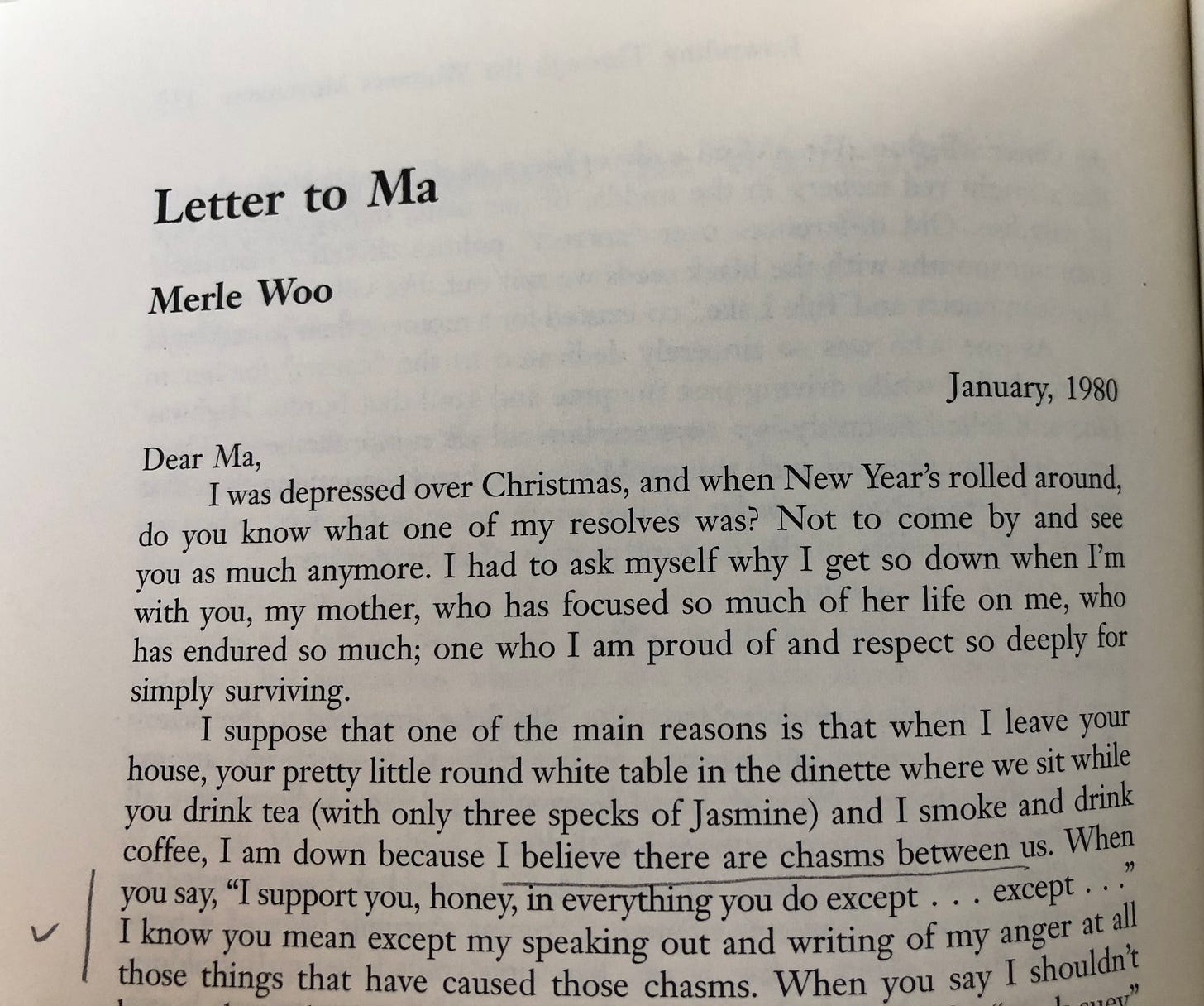38. re-reading "this bridge called my back"
thinking about this seminal work of collective writing
Hi there! 👋 I’m Ida, and this is tiny driver, a newsletter about research, pedagogy, culture and their intersections. Thank you for being here. Reach out anytime by just hitting reply, I love hearing from you.
Hello and happy Monday to you all. I hope that you all had a chance to go outside this weekend. Despite the work that I had to do this weekend, I scheduled a little time to go and explore one of my favorite neighborhoods in Chicago: Wicker Park.
When I was in college, I remember taking the Blue Line up to Wicker Park with friends. We would walk down Milwaukee, spend hours in Myopic Books, check out all the vintage stores, eat at Big Star, get dessert at Mindy's Hot Chocolate, etc etc. I loved walking by the houses on Walcott and sitting at the park next to the Damen stop as I chilled and watched all the cute little dogs. It was my go-to neighborhood when I wanted to get out of Hyde Park. It gave me a sense of comfort—I loved the residential feel and that there seemed to be so many places to explore.
So, when Saturday rolled around and it was a sunny day in the mid-60s, I seized! the! moment! and headed on over to the neighborhood that meant so much to me so many years ago.
One place I made sure to stop by was Quimby's Bookstore on North Ave. This bookstore specializes in—you guessed it—zines! I've loved this place ever since I happened upon it my senior year of college. They have a lot of interesting books, periodicals, and graphic novels that are published by smaller presses and literary journals, but I think that their real specialty is zines.
Zines line the walls here, categorized by subject matter (Photography zines, food zines, self help zines, political zines, Chicago zines, zines by the staff—it goes on and on.) I probably was in there for about an hour just browsing the titles and enjoying the fun tunes playing on the speakers.
If you are in Chicago, I'd highly recommend the spot. And even if you're not, they do some pretty rad "New Stuff Saturdays" livestreams on their Instagram.
What I teach.
Last week, I wrote about a course that I taught last quarter. This week, I'm looking forward in deep anticipation for the courses I'll facilitate this quarter.
One of the classes is called "Asian Americans and Third World Solidarity." (A couple weeks ago, I shared a drafted reading schedule with you all, so the title might sound familiar.) We start the quarter out with historically contextualizing Third World Internationalism before the mid-twentieth century, and then dive into its relationship to Asian America. Finally, we spend four weeks of the course thinking about Third World feminisms.
Critical to this part of the course are selections from the anthology This Bridge Called My Back: Writings by Radical Women of Color, edited by Cherríe Moraga and Gloria Anzaldúa. If you're interested, here are the readings that I've paired with it:
If you're not familiar with the work, This Bridge Called My Back was first published in 1981 as a way of bringing the experiences of women of color in the US to the forefront of conversations on feminism that were occurring at the time. This passage from the introduction gets to the heart of the goals and driver behind this collective work:
I first read this work as a grad student, although I wish I had learned about it much sooner than that. I remember feeling a sense of being seen, being heard. I'm sure that I am not alone in this.
I often say that grad school + researching/writing in my field of study gave me a vocabulary for articulating so many of the feelings and experiences that I couldn't categorize growing up and just being in the world. It gave me a sense of how these feelings came to be. I've been able to understand and process so many experiences in retrospect, and have come to find a deep sense of peace with the way that I grew up and the evolution of my opinions and thoughts. I feel very lucky to have had these moments and this time to learn.
While I read This Bridge Called My Back during this time, it actually came to serve a different function for me. More than articulate and explain the dynamics that pervaded (and continue to pervade) societal structures, this book captured why—why I was angry, tired, confused, uncomfortable in certain situations... The whys that are not abstracted out to larger systems, but very precise and personal. A specific interaction, a specific memory, a specific ideal. It feels as though many of the contributions to this text speak from a very particular memory and emotion. It is then through these details that the larger arc of Third World feminisms emerges.
Upon re-reading it to select which passages I wanted students to read, I was taken aback by how certain essays still managed to affect me so deeply. I know that good work does this often, but it is surprising nonetheless. Upon re-reading Mitsuye Yamada's "Invisibility is an Unnatural Disaster," for instance, I stared out the window for a good half-hour, thinking abou the ways in which so much of her writing has particular implications in our current moment of rampant anti-Asian violence. This passage left me paralyzed:
And then there's Merle Woo's "Letter to Ma" that starts off with an absolute punch to the gut:
So many of my students last quarter talked about the intergenerational divide that they felt between their generation and their parents' generation. I wish that I had recommended this essay in class, because it speaks to so much of how they were feeling, what they were trying to organize around and be mindful of. I saw their deep desire to call in the older members of their community, and I wish I had let them know that they have never been alone in this endeavor. It has been going on for many decades before them, and will probably take many decades more of work.
These are the essays that made me. Even though it's been many years since I've read the anthology, I've found that they continue to make me.
If you've read This Bridge Called My Back, I'd love to hear about your personal journey with the work. Or if you read it in the future, I'd be so interested to know what you think of it. Also, if you'd like to know which essays I assigned for my class, feel free to email me and I'll send you the syllabus. 💖
What I consume.
In the Bookshop:
Currently Reading: Sins of the Father by Mia Counts Lynch
On Deck: The Weak Spot by Lucie Elven
For our inaugural book club, we will be reading & discussing John McPhee's Draft No. 4: On the Writing Process.
Date & Time: Tuesday, April 27 at 5PM PST/8PM EST
Registration link!!
Suggested donation (for those able to donate): $3-20 through Paypal or Venmo (@idyalz)
Item(s) of note.

Nadine Naber shares her grounding practice for doing radical academic work with less anxiety
I will be sewing ribbons into my duvet this afternoon after reading this.
A pup-date.
Mr. Higgins got to spend some time sun-bathing in the grass nearby his home. His smolder is unreal—someone get this pupper a modeling contract pronto!
As always, thanks so much for reading through, and I'll see you in the next one!
Warmly,
Ida










